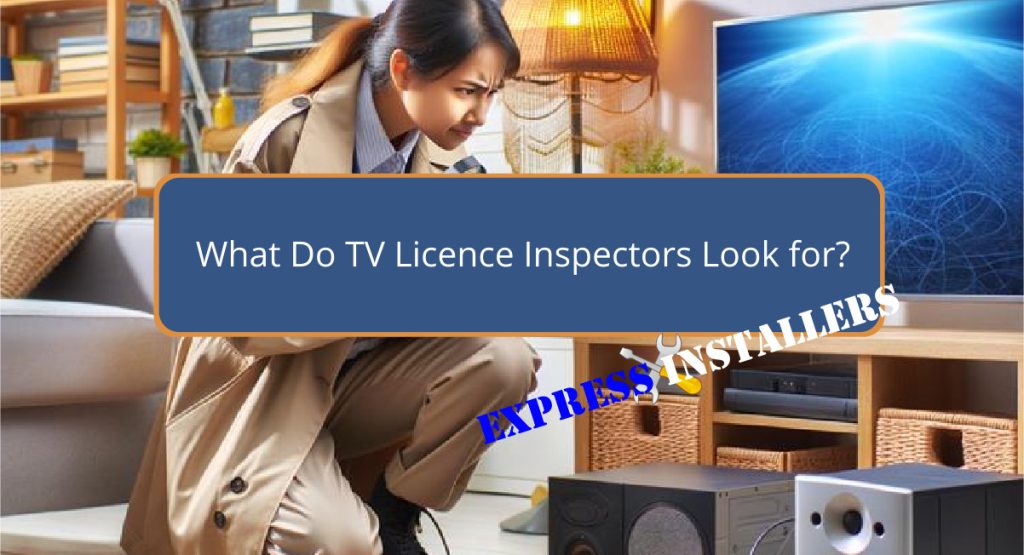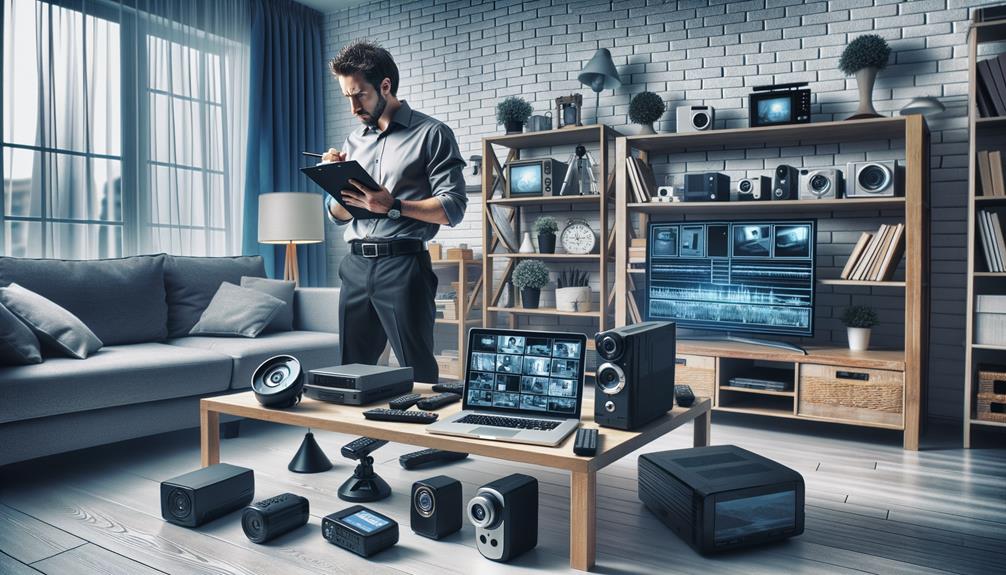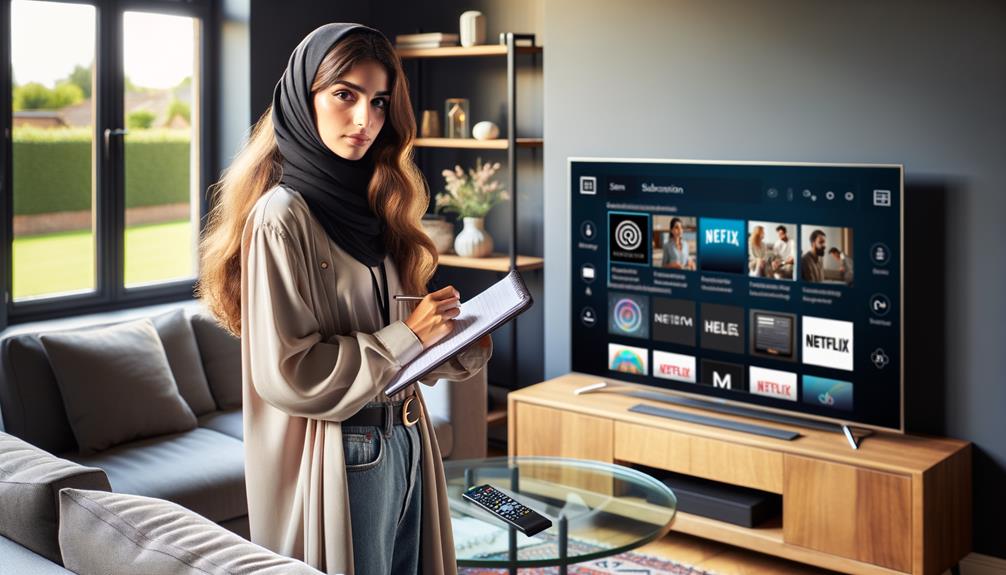
TV Licence inspectors verify you have a valid licence and may ask to see a physical copy or payment proof.
They check devices like Smart TVs for access to live TV or BBC iPlayer, focusing on internet connections and settings.
Recording equipment, such as DVRs, is examined for live broadcast capabilities. Inspectors also look for antennas, satellite dishes, and other setups indicating live TV access.
They verify streaming service use, scrutinising account details and history to confirm compliance. These steps thoroughly check adherence to licensing requirements.
Continue to understand the detailed process and what inspectors consider compliance.
Quick Summary
- Inspectors verify the presence of a valid TV Licence at the inspected address.
- They check devices, especially Smart TVs, for access to live TV or BBC iPlayer.
- Inspectors scrutinise recording equipment for compatibility with live TV services.
- Detection of antennas, satellite dishes, and cable connections for live broadcasts is conducted.
- Verification of internet connections and streaming history on Smart TVs ensures compliance.
- For TV Wall Mounting and cable concealing in all wall types? Fill out the Form Below for instant quotation and same-day/ next-day TV wall mounting service.
Valid TV Licence Check
When TV Licence inspectors visit your home, they’re primarily focused on verifying the presence of a valid TV Licence, either through physical documentation or confirmation of payment.
To do this, they employ various licence validation methods.
You’ll likely be asked to present a physical copy of your TV Licence, or they may request confirmation of payment details.
This could include showing a bank statement or a receipt that confirms your recent payment.
Inspectors also have access to a central database where they can cross-check your address against the list of valid TV Licences. This helps them verify the status quickly and efficiently, guaranteeing compliance with TV Licensing regulations.
Moreover, if you claim an exemption, such as for not watching live TV or not using BBC iPlayer, you must be prepared to provide exemption proof requirements.
This could include demonstrating that your devices are used solely for non-live TV activities or showing that you don’t have any TV equipment setup capable of receiving live broadcasts.
Understanding these procedures can help you prepare for an inspection and make sure you meet all requirements, thereby avoiding any potential fines or legal issues.
Inspection of Devices
As part of their visit, TV Licence inspectors will also inspect the devices in your home to make sure they’re not being used to access live TV or BBC iPlayer without a valid licence.
They’ll focus on device compatibility, particularly looking at Smart TV models and other equipment that can stream live TV content.
Inspectors have the authority to check if your TV is connected to the internet, which is vital for accessing streaming services like BBC iPlayer.
When examining Smart TVs, inspectors will assess the device’s ability to stream live broadcasts or connect to streaming platforms.
They’ll scrutinise settings that could indicate the use of unlicensed streaming. Inspectors are particularly interested in the streaming quality and internet connectivity of these devices, as these factors directly impact the ability to watch live TV.
However, inspectors can’t insist on checking personal devices like laptops or phones. Their main goal is to verify if your property is using TV services that require a licence.
By focusing on the devices most likely to access live content, they aim to ensure compliance with TV licensing regulations.
Recording Equipment

TV Licence inspectors frequently examine recording equipment like DVRs, set-top boxes, or DVD recorders to determine if they’re being used to access live TV channels without a valid licence.
They look for devices capable of recording live broadcasts, including smart TVs with built-in recording capabilities.
Inspectors closely scrutinise equipment connected to antennas or satellite dishes, as these connections can indicate the potential to access live TV without appropriate licensing.
Device compatibility plays an essential role in their assessments. Inspectors evaluate whether your recording equipment is compatible with live TV services.
This involves checking if the devices can record live content even when not actively watched. For instance, a DVR with scheduled recording features might raise red flags.
Privacy concerns are also addressed during these inspections. While inspectors are authorised to check recording devices, they must respect your privacy.
They focus on the functionality and setup of the equipment rather than personal content. However, if they find that your devices are capable of recording live TV without a licence, further action can be taken.
Ensuring your recording equipment is compliant with licensing requirements helps avoid potential legal issues.
Live Broadcasts Detection
Inspectors meticulously search for indicators of live TV access, such as antennas, satellite dishes, or cable connections, to verify compliance with TV Licensing regulations.
They focus on detecting real-time viewing of TV programs through traditional broadcasts and online platforms.
To guarantee thorough checks, inspectors carry out:
- Antenna detection: Identifying and inspecting external antennas that suggest live TV access.
- Satellite dish inspection: Checking for satellite dishes that might receive live broadcasts.
- Cable connection verification: Making certain that cable connections aren’t providing unauthorised live TV content.
- Smart TV checks: Examining Smart TVs for apps and functionalities that can stream live TV.
- Device inspections: Reviewing connected devices for signs of live TV consumption.
These methods help inspectors pinpoint various setups people might use to access live broadcasts.
For instance, antenna detection involves scrutinising rooftops and exterior walls. Satellite dish inspection requires a close look at any satellite equipment mounted on your property.
Cable connection verification is equally meticulous, as inspectors confirm that any wired connections align with licensing requirements.
Smart TV checks and device inspections delve deeper into your home electronics to uncover hidden access points to live streams.
By combining these techniques, inspectors ensure thorough compliance with TV Licensing regulations.
Streaming Services Verification

When verifying streaming services, inspectors meticulously examine Smart TVs and connected devices to guarantee compliance with TV Licence regulations.
They conduct an internet connection analysis to determine if the device has been used to access content that requires a TV Licence, such as live TV broadcasts or BBC iPlayer.
Inspectors start by scrutinising device compatibility to make sure that the Smart TV or connected device is capable of streaming live TV or accessing BBC iPlayer.
They then proceed with user account verification, checking if accounts registered on these devices have been used to stream licensed content.
This step is important in confirming that the user is adhering to the TV Licence requirements.
Furthermore, inspectors perform a streaming history review to identify any instances of live TV viewing or iPlayer usage.
This thorough examination helps them pinpoint non-compliance, ensuring that all viewing activities align with the TV Licence rules.
Frequently Asked Questions
How Do TV Licensing Investigate You?
TV licensing investigates you by cross-referencing their license database with addresses. They might use detector vans to identify unlicensed TV signals. Remember, you’re not obligated to let inspectors in or share device details.
How Do TV Licensing Prove You Watch TV?
To prove you watch TV, inspectors use detection equipment to monitor signals. They analyse viewing habits but can’t force entry or check devices. You can declare online if you genuinely don’t need a TV Licence.
Can You Refuse to Let TV Licence Inspector?
You can refuse to let a TV Licence inspector enter your home. There are no legal implications unless they have a search warrant. It’s important to know your personal rights in these situations.
Do TV Licence Inspectors Visit at Night?
TV Licence inspectors rarely conduct night visits. Inspection hours are typically during the day for safety and clarity. They aim to catch you when you’re likely home, ensuring effective communication and verification of compliance.
Conclusion
To guarantee compliance, TV licence inspectors will closely examine your licence status, inspect your devices for capabilities, and check for any recording equipment.
They’ll also detect if you’re watching live broadcasts and verify your use of streaming services.
By understanding these rigorous checks, you can better prepare for an inspection.
Staying informed and ensuring you have the appropriate licences will help you avoid penalties and stay within legal boundaries.
